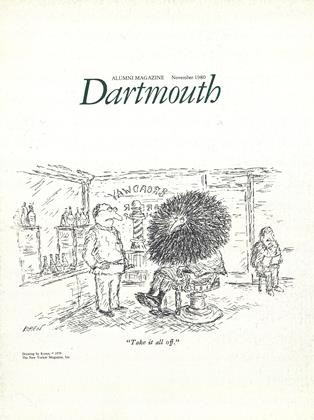"Not wanting to be left out," Barry Linsky begins, in an apparent allusion to your secretary's repeated disparaging remarks about the surfeit of vice presidents in the class' ranks. He then continues: "I'm enclosing a press release announcing my recent promotion to executive vice president of The Marschalk Co., a New York advertising agency. So much for the corporate-ladder routine."
He apologizes for having no "'muggings or scandals to report," but he and his wife, Jane Weston, an editor at The New York Times, have had a few recent experiences that the rest of us might wish to emulate. One of this column's many functions is the purveying of vicarious pleasures. In recent summers they've been sailing in the Mediterranean and doublechecking Darwin's observations with a cruise around the Galapagos islands. Some of this sailing, more over, has been serious stuff ocean racing and when not behind the mast Barry has been mountain climbing in Kenya, Morrocco, Mexico, and Ecuador. He also climbed Mount St. Helens last September, but disclaims any responsibility whatsoever for what happened there after his visit.
"We recently demonstrated our commitment to New York City by purchasing a co-op here," Barry also reports, "which, along with a little beach house in the Hamptons, has added more than a little debt to our personal balance sheet."
The press release (and I do read these press releases, so watch what they say) notes that Barry has won his company's President's Award three times since joining the company in 1972. (Prior to that Barry had been marketing manager for Tetley Tea at Beech-Nut Inc., and between graduating from Tuck and that job he had also worked for Clairol Inc. and Lever Brothers Co.) At Marschalk, the release indicates, Barry has been working with Gilette and Maybelline, among other clients, and helped develop a "new products group."
When last we heard from Tom Berger a year or so ago he was off to London on some fancy fellowship. He's back at St. Lawrence University now where they have promoted Tom to the rank of full professor. While in London he also headed his college's "semester in London" program. He has been at St. Lawrence since 1971.
Critic Stanley Kauffman had some very nice things to say about Bob Gitt in a recent column in the New Republic. Working with the Folger Shakespeare Library in Washington, Bob, who is now a film archivist at U.C.L.A., "found and put back 21 minutes that had been cut by Republic Studios" from Orson Welles' Macbeth, and also restored the sound track and editing so that the re-released version is in accord with Welles' original intentions. The result, Kauffman says, was that this particular Macbeth "which had nowhere to go but up," now can be seen as a "bold, exciting, innovative film."
The restorations, Kauffman contends, have a particularly beneficial effect on Wells' performance of the king with the pushy wife. "His (Welles') reading of 'Tomorrow and tomorrow and tomorrow,' during which we look at only one shot of swirling clouds, is the best I have ever heard ... We owe it all to Bob Gitt, Kauffman concluded.
As I suspect many of us have read, Tim Kraft has left his post as deputy director of the Carter campaign to await the outcome of an investigation by two (count 'em, two) special prosecutors of the charge that Tim used cocaine once several years ago. Many of you may not, however, have seen an intriguing column that Richard Cohen of The Washington Post, one of the few remaining voices of reason in Washington journalism, did on the situation. I thought a short excerpt might be of interest:
"In Hollywood and New York and some other places where people have more money than sense, cocaine is as common at parties as cheese dip," Cohen writes. "This is not to say that someone who snorts cocaine while on the White House staff does not have serious problems of judgment. He or she does. . . . But that is a matter for the President, for the voters, not for some special prosecutor. . . .
"The problem with the Kraft case is not the new ethics law or the special prosecutor, but instead our refusal to really distinguish between selling drugs and taking drugs, between committing a crime in which someone or something is hurt, and doing something that is either innocuous, or, at the very worst, personally damaging. What the Kraft case proves is that we are not hung up over Watergate and government ethics, but instead that we are hung up over drugs."
7809 Winston Road Philadelphia, Pa. 19118
 View Full Issue
View Full Issue
More From This Issue
-
 Feature
FeatureHAIR
November 1980 By Dan Nelson -
 Feature
FeatureNow Let Him Praise Emmets
November 1980 By Robert Sullivan -
 Feature
FeaturePostmark: Bucharest
November 1980 By Douglas Reichert -
 Article
ArticleTrusteeship and the Alumni
November 1980 -
 Article
ArticleUnofficial Arbiter
November 1980 By Patricia Berry '81 -
 Article
ArticleWanted: Road-trip Messerly
November 1980 By Parker B. Smith '66
DAVID R. BOLDT
Class Notes
-
 CLASS NOTES
CLASS NOTESClubs & Groups
NOVEMBER | DECEMBER 2019 -
 Class Notes
Class Notes1901*
October 1941 By EVERETT M. STEVENS -
 Class Notes
Class NotesClass of 1909
May, 1924 By Joseph W. Worthen -
 Class Notes
Class NotesClass of 1897
May 1929 By Morton C. Tuttle -
 Class Notes
Class Notes1948
JUNE 1968 By SAMUEL A. WILKINSON, LOUIS N. PERRY JR. -
 Class Notes
Class Notes1988
Sept/Oct 2007 By Townley Slack








